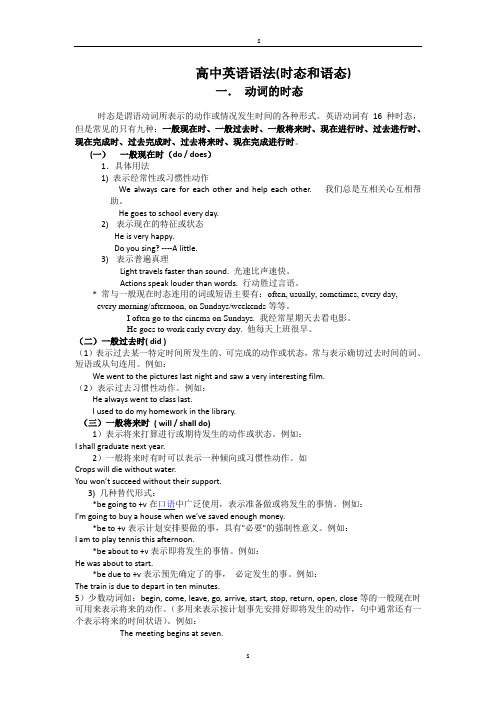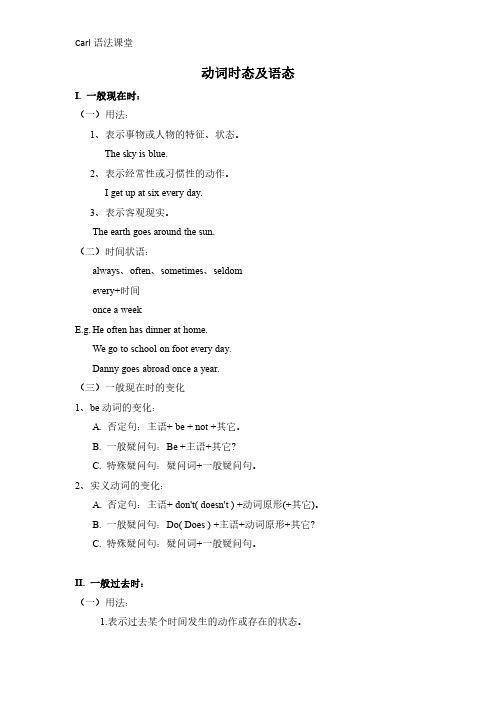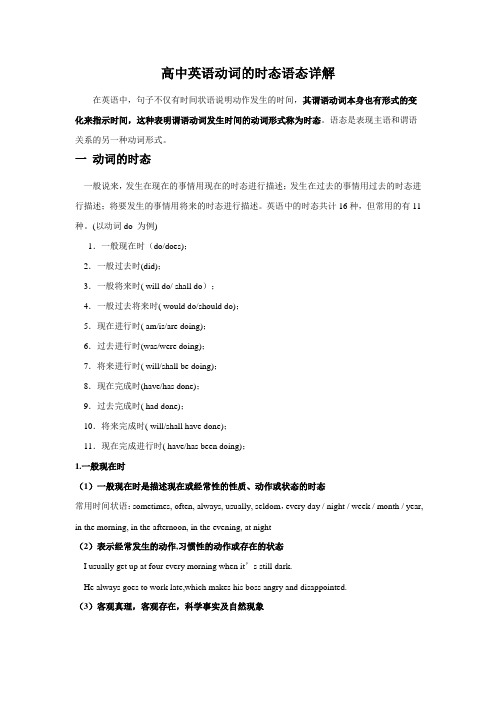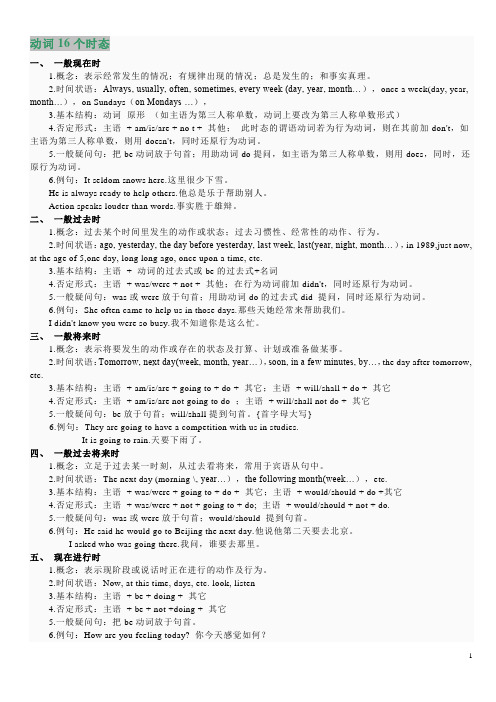高中英语-动词时态(二)讲义
高中英语时态全版.ppt

Tom is seeing his friend off at the airport.
.精品课件.
16
过去进行时 表示过去某一时刻或某一段时间内正在进行 的动作。这一特定的过时间可用时间状语表 示
He was watching TV when I came in.
---What were you doing this time yesterday? ---I was writing a letter.
I will study hard to keep up with my classmates.
He won’t do it.
You shall have the book.
.精品课件.
8
2.be going to + 动词原形:含有打算、计划、 准备将做某事的意思,或表示很有可能要发 生的事。
3.若表示已安排或计划好的将来动作或存 在状态,可用一般现在时代替一般将来 时,其谓语动词常为be, come, go, arrive, leave, start等
Where shall we meet tomorrow?
.精品课件.
7
注:shall和will除了上述表示单纯的将来外, 还有其他用法。在第一人称后,will常表示 “决心”、“意愿”或“打算”,在否定
句中用于所有人称,有“不愿”的意思。 shall用于第二人称时,可表示说明者的将 来意愿或允诺。
the window.)
.精品课件.
4
7. 由here, there开头的句子,动词 用一般现在时表示正在发生的动 作。如:
There goes the bell.
Here comes the teacher.
高中英语语法:动词的时态课件

二、一般过去时
(2)语境中的一般过去时,往往表示“刚才,在过去”之意,暗 示现在“已不再这样”。 Oh,how nice of you! I never thought you were going to bring me a gift.噢,你真是太好了!我没想到你会给我送礼物。 I didn’t notice where I was going.我当时没有注意到正往哪儿走。 Oh, it’s you, Mary. I didn’t know you would come.噢,是你啊,玛 丽,我不知道你会来。 (3)在时间和条件状语从句中,代替过去将来时。 Mary said as soon as she arrived there, she would ring me up.玛丽说 她一到达那里就给我打电话。
read reads读
write writes写
become becomes变成
know knows知道
一、一般现在时
(2)以字母s,x, ch, sh,o结尾的单词在词尾加-es。
watch watches观看
do does做
guess guesses 猜测
finish finishes完成
(3)以“辅音字母+y”结尾的动词,先变y为i,再加-es。
动词的时态综述
英语动词的时态变化共有一般、完成、进 行和完成进行4种形式,每种形式又包括现在、 过去、将来和过去将来4个时间,共组合成16 种时态形式。 高中英语课程标准要求同学们掌握的时态只有 8种:一般现在时、一般过去时、一般将来时、 现在进行时、过去进行时、现在完成时、过去 完成时、过去将来时。
stir
stirred搅拌
planΒιβλιοθήκη planned计划二、一般过去时
高中英语语法知识之时态

动词时态及被动态概述:中文中的动词不会随时间的变化而变化,但英文中的动词是会随着时间变化而变化的。
如:中文英文我昨天 打扫了教室。
I cleaned the classroom yesterday . 我明天 将要打扫教室。
I will clean the classroom tomorrow .中文的被动 英文的被动教室昨天被我打扫过了。
The classroom was cleaned by me yesterday. 教室明天将要被我打扫。
The classroom will be cleaned by me tomorrow. 英文中的动词如何随着时间和语态的变化而变化----- 时态&被动态英文中时态及被动态的构成是有助动词和实义动词一起构成的。
否定及疑问句也要借助这些助动词 助动词有:be(am, is, are, was, were), do/does/did, have/has/had, will 等三、过去时一般过去时过去进行时过去完成时过去将来时主动态动词变化did was/were doing had done ①would do②was / were going to do③was / were to do④was / were about to do (when)⑤主将从现(条件,时间状从)⑥进行时表将来(瞬间动词)被动态动词变化was/were done was/were being done had been done ①would/shall be done②was / were going to③was/were to be done④was / were about to时态系列1: 现在时各时态讲解一、一般现在时什么时候用:1. 表示人、事物的现在状况和特点;2. 表示经常或习惯性的动作;3. 表示客观规律和永恒真理She has a brother who lives in New York.He usually goes to work at 7 o’clock every morning.I learned that the earth goes around the sun when I was in primary school.(备注:表示永恒的真理,即使出现在过去的语境中,仍用一般现在时)二、现在进行时什么时候用:1.表示说话时正在进行的动作.可与now, at present, at this moment等时间短语连用,也可不用时间短语.例如: He is reading a novel now.2.表示现阶段正在进行的动作或发生的情况,这种动作说话时不一定正在进行,只是强调现阶段的暂时性。
(完整)高中英语语法(时态和语态)

高中英语语法(时态和语态)一.动词的时态时态是谓语动词所表示的动作或情况发生时间的各种形式。
英语动词有16种时态,但是常见的只有九种:一般现在时、一般过去时、一般将来时、现在进行时、过去进行时、现在完成时、过去完成时、过去将来时、现在完成进行时。
(一)一般现在时(do / does)1.具体用法1) 表示经常性或习惯性动作We always care for each other and help each other. 我们总是互相关心互相帮助。
He goes to school every day.2)表示现在的特征或状态He is very happy.Do you sing? ----A little.3)表示普遍真理Light travels faster than sound. 光速比声速快。
Actions speak louder than words. 行动胜过言语。
* 常与一般现在时态连用的词或短语主要有:often, usually, sometimes, every day,every morning/afternoon, on Sundays/weekends等等。
I often go to the cinema on Sundays. 我经常星期天去看电影。
He goes to work early every day. 他每天上班很早。
(二)一般过去时( did )(1)表示过去某一特定时间所发生的、可完成的动作或状态,常与表示确切过去时间的词、短语或从句连用。
例如:We went to the pictures last night and saw a very interesting film.(2)表示过去习惯性动作。
例如:He always went to class last.I used to do my homework in the library.(三)一般将来时( will / shall do)1)表示将来打算进行或期待发生的动作或状态。
时态及语态讲义

动词时态及语态I.一般现在时:(一)用法:1、表示事物或人物的特征、状态。
The sky is blue.2、表示经常性或习惯性的动作。
I get up at six every day.3、表示客观现实。
The earth goes around the sun.(二)时间状语:always、often、sometimes、seldomevery+时间once a weekE.g.He often has dinner at home.We go to school on foot every day.Danny goes abroad once a year.(三)一般现在时的变化1、be动词的变化:A.否定句:主语+be+not+其它。
B.一般疑问句:Be+主语+其它?C.特殊疑问句:疑问词+一般疑问句。
2、实义动词的变化:A.否定句:主语+don't(doesn't)+动词原形(+其它)。
B.一般疑问句:Do(Does)+主语+动词原形+其它?C.特殊疑问句:疑问词+一般疑问句。
II.一般过去时:(一)用法:1.表示过去某个时间发生的动作或存在的状态。
I got up at seven yesterday morning.2.表示过去经常或反复发生的动作。
My mother often went to work by taxi last year.(二)时间状语:yesterday,yesterday morning(afternoon,evening…)last night(week,month,year…),two days agoin1990in the pastOnce upon a timeE.g.He was busy yesterday.We stayed there for10days last month.The Lis moved to Shanghai8years ago.(三)一般过去时的变化1、be动词的变化:A.否定句:主语+was/were+not+其它。
高中英语语法必备之谓语动词的时态和语态详解

高中英语动词的时态语态详解在英语中,句子不仅有时间状语说明动作发生的时间,其谓语动词本身也有形式的变化来指示时间,这种表明谓语动词发生时间的动词形式称为时态。
语态是表现主语和谓语关系的另一种动词形式。
一动词的时态一般说来,发生在现在的事情用现在的时态进行描述;发生在过去的事情用过去的时态进行描述;将要发生的事情用将来的时态进行描述。
英语中的时态共计16种,但常用的有11种。
(以动词do 为例)1.一般现在时(do/does);2.一般过去时(did);3.一般将来时( will do/ shall do);4.一般过去将来时( would do/should do);5.现在进行时( am/is/are doing);6.过去进行时(was/were doing);7.将来进行时( will/shall be doing);8.现在完成时(have/has done);9.过去完成时( had done);10.将来完成时( will/shall have done);11.现在完成进行时( have/has been doing);1.一般现在时(1)一般现在时是描述现在或经常性的性质、动作或状态的时态常用时间状语:sometimes, often, always, usually, seldom,every day / night / week / month / year, in the morning, in the afternoon, in the evening, at night(2)表示经常发生的动作,习惯性的动作或存在的状态I usually get up at four every morning when it’s still dark.He always goes to work late,which makes his boss angry and disappointed.(3)客观真理,客观存在,科学事实及自然现象The sun rises in the east and sets in the west every day.The man who has never been to the Great Wall is not a real man.Trees turn green in spring. Liquid turns into gas when it is hot enough.(4)表示格言或警句中Pride goes before a fall.Knowledge is power.Practice makes perfect.(5)一般现在时表将来表示已经计划、安排好了或时间表上所安排,并且一定要做的事情。
动词的时态讲义(2013-寒-语法A项班级)

英语动词时态(Tenses)英语时态是英语语法中的第一道难关,攻下此难关是作文、阅读、口语之关键。
汉语用不同词表达相应时态,而英语用同一词的不同变化形式表达时态。
英语各种时态构成表-以play为例-现在playplays isam playingarehashave playedhashave been playing过去played waswere playinghad played had been playing将来shallwill play shallwill be playingshallwill have playedshallwill have been playing过去将来shouldwould playshouldwould be playingshouldwould haveplayedshouldwould have been playing一、一般现在时:1.构成:使用动词原形,第三人称单数须有变化。
1)直接加“s”,works,takes2)以辅音加“y”结尾,变“y”为“i”,再加“es”carry→carries3)以“o,s,x,ch,sh”结尾的动词加“es”goes dresses watches brushes2.功能:1)表现在的事实、状态或动作:eg:►.Birds fly.►.She loves music.►.Mary's parents get up very early.2)表习惯性动作或职业,常与often,sometimes,usually,always,every week,seldom,occasionally,frequently等时间副词连用。
eg:►.I always take a walk after supper.►.She writes to me very often.►.Tom and his girlfriend go out to take a picnic occasionally.3)表客观真理,格言警句或事实:►.The earth moves round the sun.►.The sun rises in the east and sets in the west.►.T wo and two makes four.►.No man but errs.人非圣贤,熟能无过。
高中英语中的16种时态详细讲解

动词16个时态一、一般现在时1.概念:表示经常发生的情况;有规律出现的情况;总是发生的;和事实真理。
2.时间状语:Always, usually, often, sometimes, every week (day, year, month…),once a week(day, year, month…),on Sundays(on Mondays …),3.基本结构:动词原形(如主语为第三人称单数,动词上要改为第三人称单数形式)4.否定形式:主语+ am/is/are + no t + 其他;此时态的谓语动词若为行为动词,则在其前加don't,如主语为第三人称单数,则用doesn't,同时还原行为动词。
5.一般疑问句:把be动词放于句首;用助动词do提问,如主语为第三人称单数,则用does,同时,还原行为动词。
6.例句:It seldom snows here.这里很少下雪。
He is always ready to help others.他总是乐于帮助别人。
Action speaks louder than words.事实胜于雄辩。
二、一般过去时1.概念:过去某个时间里发生的动作或状态;过去习惯性、经常性的动作、行为。
2.时间状语:ago, yesterday, the day before yesterday, last week, last(year, night, month…),in 1989,just now, at the age of 5,one day, long long ago, once upon a time, etc.3.基本结构:主语+ 动词的过去式或be的过去式+名词4.否定形式:主语+ was/were + not + 其他;在行为动词前加didn't,同时还原行为动词。
5.一般疑问句:was或were放于句首;用助动词do的过去式did 提问,同时还原行为动词。
- 1、下载文档前请自行甄别文档内容的完整性,平台不提供额外的编辑、内容补充、找答案等附加服务。
- 2、"仅部分预览"的文档,不可在线预览部分如存在完整性等问题,可反馈申请退款(可完整预览的文档不适用该条件!)。
- 3、如文档侵犯您的权益,请联系客服反馈,我们会尽快为您处理(人工客服工作时间:9:00-18:30)。
高中英语复习动词时态(二)一. 现在进行时定义:表示说话人说话时正在进行的动作,或现阶段内在进行的动作,汉语常用“正在”表示。
由“助动词am /is / are + (not)+ 现在分词”构成。
如:①Is it raining?②I am doing my homework.③The students are cleaning the classroom.④- What are you doing now? - I'm doing some washing.现在进行时的用法:1)说话时(此时此刻)正在进行的动作。
Is it snowing now?2)表示现阶段正在进行的动作,虽然此时此刻这一动作不一定在进行。
How are you getting on with your work these days?3)go;leave;arrive;start 等动词用现在进行时态表示将来。
4)当时间状语为now; these days;等或当句子中含有look ; listen; can you see之类的暗示词时,要用现在进行时态。
但是下列感觉和状态动词常用一般现在时而不用现在进行时。
下列动词表示所给意义时,一般不可用进行时。
①表感觉的:see(看见),look (看上去),feel/ find (觉得),hear(听见),notice (觉察到),smell (闻起来),sou nd (听起来),taste(尝起来)等。
②表感情的:love (爱),like (喜欢),hate (恨),prefer (更喜欢),want (想要),wish (祝愿),envy (嫉妒;羡慕),desire (渴望)等。
③表归属的:have (有),own (拥有),owe (欠),belong (属于),possess (拥有)等。
④表思想和思考的:believe (相信),doubt (怀疑),hope (希望),know (懂得)等。
I feel a sudden pain in my head. 我脑袋突然痛了。
He appears to want to go. 他好像要走。
She feels worse today.她今天感觉更不好受。
The dish smells good. 这盘菜闻起来很香。
练习:1. Look. Lucy is ____ a new bike today.A. jumpi ngB. runningC. ridi ng D tak ing2. The childre n ____ football.A. is playi ngB. are playi ngC. play theD. play a3. They _____ TV in the evening. They do their homework.A. are watch ingB. can't watch ingC. don't watchD. don't watch ing二.过去进行时结构:was /were+现在分词(1)主要表示过去某时刻(侯)正在进行的动作。
常和表示过去的时间状语为:at that time; this time yesterday; at tenyesterday 等连用。
(2)过去进行时常和always等表示频率的副词连用,表示过去频繁发生的习惯性动作。
例: Alice was always changing her mind.(3)在含有when/while的时间状语从句中,过去进行时的运用:1) 主句的动作先于从句发生,且进行的时间较长时,主句用过去进行时(从句常用一般过去时)2) 从句的动作先于主句发生,且进行时间教长时,从句用过去进行时,(主句常用一般过去时)3) 若主从句不存在先后关系,主从句课同时使用过去进行时,此时的时间状语多由while引导。
(4)过去进行时与一般过去时的区别:前者表示正在进行的动作,后者表示一个完成的动作。
It rain ed/was raining all day yesterday.He coughed/was cough ing the whole ni ght.练习:1.1 _______ (read)a no vel whe n he came in.2. __________ What _____ you (do) at eight yesterday?3.1 _________ (watch) TV all evening.4. While we _________ (wait) for the bus, a girl __________ (run) up to us.5. I _________ (telepho ne) a frie nd whe n Bob __________ (come) in.6. Jim _________ (jump) on the bus as it __________ (move) away.7. We _________ (test) the new mach ine whe n the electricity _________ (go) off.二.现在完成时基本结构:助动词have / has+过去分词(1)表示过去发生的某一动作对现在产生的影响或者结果。
I have lost my book.I have n ever see n such a big apple.He has remembered 500 words this mon th.Great cha nges have take n place in the last ten years.(2)过去开始的动作或存在的状态一直延续到现在,常和“for+寸间段;since+时间点”连用,谓语动词多为延续性动词。
I have lived here for 20 years.(动作持续)He has been here since 2017.(状态持续)☆由于arrive,come,become,join和get up等动词表短暂动作不可延续,需要借助含be的结构来表示延续的状^态。
现在完成时常用的状语:just, already, ever, n ever, before, yet, up to now, today, this mon th, lately, recen tly, so far, ever since, in the last / past few years 等。
例: I have fini shed read ing five books so far.注意:现在完成时强调对现在的影响,是现在时态,因此不能和表示具体的过去时间连用,如如:yesterday, lastmo nth, three days ago, in 1960等。
但可以和表示模糊的过去时间的before连用。
现在完成时与延续性动词和非延续性动词a. 延续性动词可用现在完成时,并可接表时间段的状语。
I have worked here for ten years.b. 非延续性动词也可用现在完成时,但肯定句中不接since/for引出的表示时间段的状语(否定句中可以)。
常用的瞬间动词有go, come, arrive, leave, begi n, borrow, marry, die, fall, fini sh, stop, start, lose, sell, kill, break, meet, close, ope n, graduate, jo in 等。
如:He has died.(“He has died for ten years. ( x)He died ten years ago.(话I have n't received his letter for a long time. (“注意,否定句中非延续性动词可与一段时间连用。
例:I haven ' t gone to see him for several months.C•非延续性动词与一段时间连用,需要转换:Buy -have CatCh a Cold -have aColdBorrow-keep put on-wearOpen-be open wake up-be awake Close-be Closed fall asleep-be asleep Begin/start-be on lose-not haveCome-be here join-be inGo-be there leave-be awayFinish-be over arrive/reaCh-beDie-be deadd.句型:It is + 一段时间+sinee从句(从句中谓语动词用非延续动词的过去式) It is 2 years sinCe the old mandied.(3) 现在完成时和一般过去时的区别(4)have been to /have gone to /have been in 三种结构的区别练习:1.The famous writer one new book in the past two year .A. is writingB.was writingC.wroteD.has written2. —Our Country ______ a lot so far . —Yes. I hope it will be even ____A. has Changed ; wellB. Changed; goodC. has Changed ; betterD. Changed; better3. She ' s _____________ (live) here ever sinCe she was ten.4. Both of them _______________ (be) in Hongkong for ten days.5. Both of them _______________ (Come) to Hongkong ten days ago.6. Half an hour _________ (pass) sinCe the train _________ (leave).Hey~我们一起小试牛刀一下吧【基础题】1. I_______ a meal whe n you ____ me.A. cooked, were ringingB. was cook ing, rangC. was cook ing, were ringingD. cooked, rang2. He said he ____ to draw a pla ne on the blackboard at that time.A. triesB. triedC. was tryi ngD. will try3. While she _____ TV, she ______ a sound outside the room.A. was watchi ng, was heari ngB. watched, was heari ngC. watched, heardD. was watchi ng, heard4. They _____ a football game from 7 to 9 last ni ght.A. were watch ingB. watchC. watchedD. are watch ing5. What book ____ you ______ w hen I ___ y ou at four yesterday after noon?A. did, read, was see ingB. did, read, sawC. were, read ing, sawD. were, readi ng, was see ing6. I ___ already ____ (see) the film. I _______ (see) it last week.7. ___ he ____ (fin ish) his work today? Not yet.8. My father ___ just ____ (come) back from work. He is tired now.9. They ____ (not make) a model ship whe n I saw him.10. Where ' s Li Ming ? He ___________ (go) to the teacher ' s office.11. I_________ (work) here since I _______ (move) here in 1999.12. So far I _____________ (make) quite a few friends here.13. Was your father at home yesterday evening? Yes ,he was. He ____ (listen) to the radio.【巩固题】1. When the bell ran g,Je nny ___ (wait) in her seat.2. A girl _____ my pen fall off the table when she _____ m e.A. saw, passedB. was see ing, passedA. waitsB. waited3. He ____ h is father on the farm the whole after noon last Saturday.A. helpsB. would helpC. was helpi ngD. is helpi ng4. While mother _______ some wash in g, I ___ a kite for Kate.A. did, madeB. was doing, madeC. was doing, was makingD. did, was making5. He ____ s ome cook ing at that time, so _____ meA. did, heardB. did, didn ' t hearC. was doing, heardD. was doing, did n' t hear6. This time yesterday Jack _____ h is bike. He ______ T VA. repaired, didn ' t watchB. was repairing, watchedC. repaired, watchedD. was repairing, wasn ' t watching7. How long _______ the Wangs ______________ (stay) here ? For two weeks.8. I _______ j ust ____________ (fin ish) my homework.9. He _______ (go) to school on foot every day.10. __ y ou ______ (find) your scie nee book yet?11. If it ____ (be) fine tomorrow, I'll go with you.12. The stude nts __________ (read) En glish whe n the teacher came in.13. Look! The mon key _________ (climb) the tree.14. My mother _________ (come) to see me next Sun day.15. I've lost my pen. ________ you _______ (see) it any where?【提高题】1. (2017 安徽)I am surprised at the new look of my hometown, for it ______ a lot over the years.A.changedB. changesC. will cha ngeD. has cha nged2. (2017 武威)We ______ TV from seven to nine last night.A. were watch ingB. willC. watchedD. watchC. was see ing, passedD. was see ing, was pass ing3. (2017 天门)Hurry up, every one! The school bus _____ for us.A. waitsB. waitedC. was waiting4. (2017 黄冈 ) — Can you tell me how long you— Nearly a year. It works very well.C. am using6. (2017 省实验模拟 ) — Tom, didn't you hear what your mother asked you to do?— Sorry, Dad. I about my homework.A. thinkB. am thinkingC. was thinkingD. thought 7. (2017 河南中考押题卷一 ) — What do you think of the new foreign teacher Thomson?— Really good. I think he a great job so far. A. does B. did C. has done D. was done 8. (2017 信阳模拟 ) — Would you please turn down the radio? My grandfather — All right. I'll do it at once. A. slept B. is sleeping C. has slept D. sleeps 9. (2017 原创 ) — Have you been to the new CenturyMart? — No. Although it for three days, I'm too busy to go there. A. has been on B. has been open C. has started D. has opened 10. I ____ (have ) my breakfast at half past six yesterday morning. 11. ____ they ___ (have ) a meeting at 4 yesterday afternoon? 12. Mary ____ (go ) over her lessons from six to seven last night. John and peter (do ) the same thing.13. She ____ (make ) her dress the whole afternoon.D. is waitingthe Huawei mobile phone, Mr. Zhang?A. will buyB. have hadC. have boughtD. had had 5. (2017 河北 ) Don't take the dictionary away. Iit. A. useB. usedD. have used。
